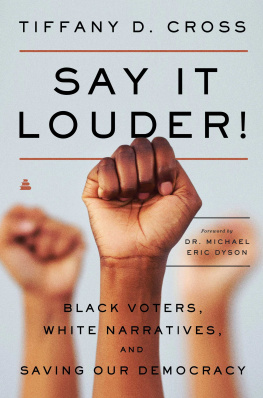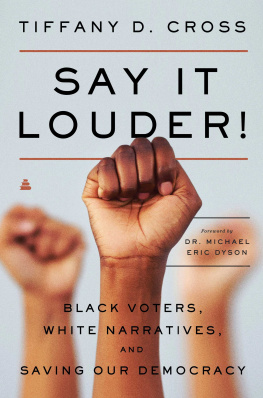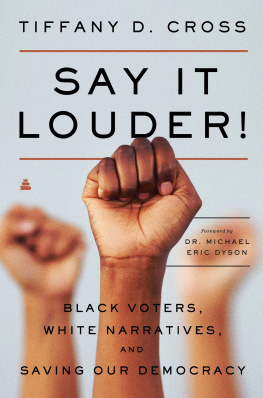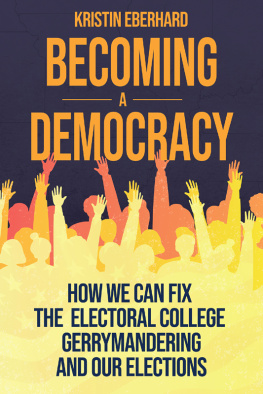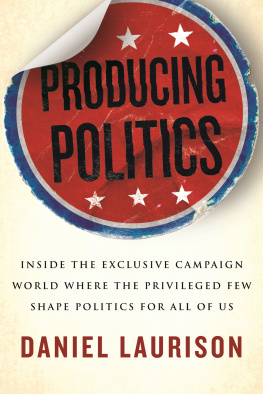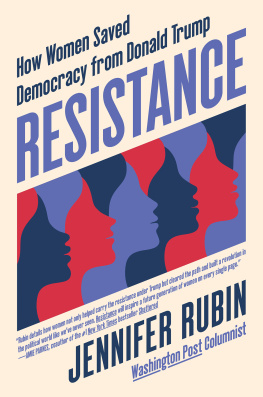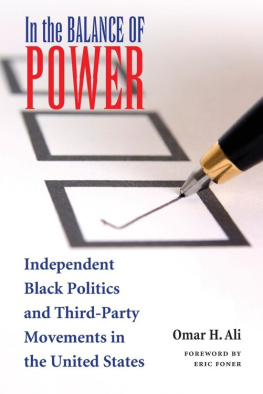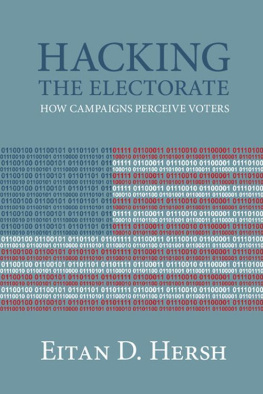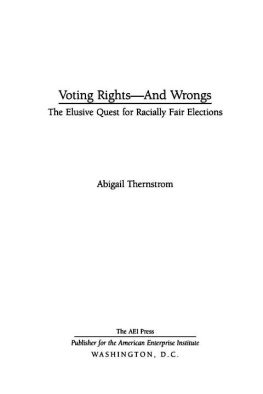For the millions of Black people, both living and dead, whose lived experiences helped to shape and save this democracy since its inception. You are not invisible.
O n February 26th, 2020, the nations highest-ranking Black Congressman dramatically changed the 2020 presidential race when he endorsed the beleaguered former vice president Joe Biden.
I know Joe. We know Joe. But most importantly, Joe knows us.
Those words radiated the sentiment of older Black Southerners who felt a sense of racial intimacy and political kinship with Biden over the years. After all, their options for acceptable political leadership, save for President Barack Obama, had been few. Clyburns affirmation was bone deep Black affirmation, too, at least among many Black folks in the region and beyond.
Most of the world was stunned at the outcome of Clyburns well-placed and signifying words. Well, that is, that part of the world that wasnt Black, that part of the world that failed, or refused, to take Black folk seriously, that part that didnt listen to our thoughts and insights and philosophies from barbershops to beauty salons, from church sanctuaries to mosque meetings, from school halls to street corners, from basketball courts to backyard cookouts. Black folk relentlessly politic, talk politics, politicize their existence, engage issues politically. And yet much of this is missed, overlooked, ignored, discounted, or downright dissed, as if it doesnt matter to the country, as if our interests dont count, as if our views dont affect democracy, or shape the nations economic or political flow, as if being Black was tangential rather than central to America.
If political observers have failed to do their due diligence, the fourth estate, too, has often been hamstrung by a biased and distorted view of Black life. How many nights have we gazed on white faces and heard white voices interpret Black experience, weigh in on Black voting behavior, or most likely, offer poorly sourced or ill-informed reflections on the complicated political expressions of Black folk where the data is congested and rarely disaggregated? There is no such thing as the Black vote, any more than there is anything like the Black community, or the Black point of view. There are Black voters, there are Black communities, there are Black points of view. Blackness, essentially, historically, and principally, is plural, not singular, is complex, not simple, is better seen in broader rather than narrow scope.
For instance, there are Black folk who endorse gay marriage, and many more, admittedly, who stand against it. There are many progressive Black folks on the political spectrum and many more in the centrist wing too. There are millions of Black folks in urban America, and many, too, who occupy the rural hinterland and rushing backwaters. There are older Black folk in the south who embrace more conservative moments of liberal thought, while some adhere strictly to leftwing beliefs. And there are younger Black folk by the thousands who embrace the democratic socialism of Bernie Sanders even as they spar with their Black peers or elders in every region of the country that favor more moderate views. Black folk also feature measured political figures like Bakari Sellers, the millennial son of Black activist royalty from South Carolina, and Maxine Waters, of the silent generation, an eighty-one-year-old progressive firebrand who was awake decades before woke folk got awakened by a political alarm clock a few days ago.
At the same time that the mainstream political and media establishment overlook the heteroglossia of Black languages of social activism and political resistance, it has focused nearly singular, at times excessive, attention on white folk and their fears, feats, and phobiastheir desires, desperations, and disappointments, tooas if they exclusively define our democracy. When important white ideas and issues are engaged in exclusion from Black ideas and issues, it makes the white ones seem essential, natural, normal, and definitive, and the Black ones appear inessential, abnormal, aberrant, and incidental. When we talk about putative white economic anxiety in a fashion that ignores the persistent economic vulnerability of Black folks and communities, it makes it appear as if Black folk dont suffer the same, if not considerably more, anxieties. It makes it appear that Black economic woes dont shape the nation in the same way, or that they dont impact the conduct or conscience of the country in the same manner.
Or, more bluntly, it makes it seem that what happens to Black folk pales politically and economically in comparison to what happens to white folk. When political actors and media pundits spotlight the suffering of the white poor, underscore the plight of the white middle classes, or focus on the doings of the white wealthy, while ignoring those of their fellow black citizens, it suggests, at best, a harsh dismissal of vast regions of Black thought and experience, and, at worst, a two-tiered, Jim-Crow system of stunted political analysis and stymied social conscience.
Into that unforgiving gap steps the remarkable Tiffany Cross. In all my fifty years of racial resistance, my forty years of political activism, my thirty-five years of scholarship, and my more than thirty years in media commentary, I have rarely met anyone as talented as Tiffany Cross. She tells hard Black truths to often clueless white audiences with panache, humor, insight, sophisticated sass, and enormous erudition. She is a woman warrior with an old soul whos capable of deep empathy for the Black generations that came before her and for those coming up behind. She is deeply learned about the political behavior of Black folk who endured naked American terrorism in the south under Jim Crow and those who endure police terror in the north under the post-Obama Trump racial apocalypse. Cross can specify the complicated character of Black political behavior. She can divine the trends and forces that shape Black belief about the country Black folk have monumentally fashioned. Cross pays serious attention to Black unemployment and ideological variety. She knows well the paradox of Black folk being the cutting edge of political progressivism even as they share the political middle with millions of white folk and others in a way rarely acknowledged.
Tiffany Cross is especially adept at parsing the meanings and modes of white supremacy as they metastasize across the body politic and show up in both our cultural gutters and our political thrones. She insists on television, as she does brilliantly in this magnificent book, that white folk see Black folk and hear Black folk and study the political terrain that Black folk so colorfully and creatively inhabit. She holds the white media to account, takes its pundits to task, for speaking of the working class without stipulating that its the white working class, the same white working class that went for Donald Trump hook, line, and sinker. As she makes clear in SAY IT LOUDER!, so did middle-class and rich white folk, too. But the Black working class hardly fell for the okey doke. That distinction is critical.
In this brilliant, engaging book, Cross disaggregates the data, crunches the numbers, breaks down the factors that constitute Black voting patterns, and identifies Black cultural forces that shape Black communities and the broader American society. Cross also makes clear that poor, middle-class, and rich white folk voted for Trump. The mainstream media and political establishment too often overlook the force of whiteness in dominant culturethe felicities, enticements, seductions, entitlements, promises, and rewards of whiteness. They also ignore how whiteness overwhelms and to a degree counteracts, and yes, at times, transcends class and economic differences.

